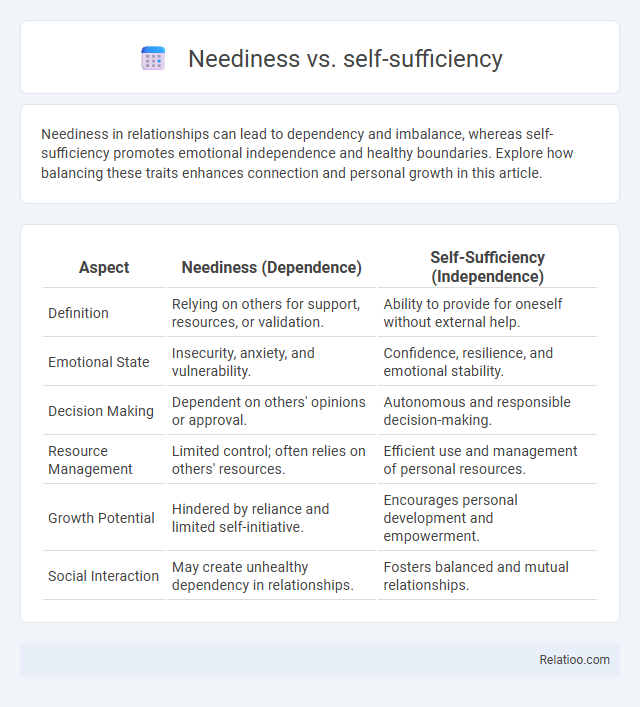Neediness in relationships can lead to dependency and imbalance, whereas self-sufficiency promotes emotional independence and healthy boundaries. Explore how balancing these traits enhances connection and personal growth in this article.
Table of Comparison
| Aspect | Neediness (Dependence) | Self-Sufficiency (Independence) |
|---|---|---|
| Definition | Relying on others for support, resources, or validation. | Ability to provide for oneself without external help. |
| Emotional State | Insecurity, anxiety, and vulnerability. | Confidence, resilience, and emotional stability. |
| Decision Making | Dependent on others' opinions or approval. | Autonomous and responsible decision-making. |
| Resource Management | Limited control; often relies on others' resources. | Efficient use and management of personal resources. |
| Growth Potential | Hindered by reliance and limited self-initiative. | Encourages personal development and empowerment. |
| Social Interaction | May create unhealthy dependency in relationships. | Fosters balanced and mutual relationships. |
Understanding the Concepts: Neediness and Self-Sufficiency
Understanding the concepts of neediness and self-sufficiency is essential for maintaining healthy emotional balance in relationships. Neediness often involves excessive dependence on others for validation and support, whereas self-sufficiency reflects an individual's ability to meet their emotional and practical needs independently. By recognizing these dynamics, you can foster stronger connections while avoiding emotional distance caused by either extreme.
Root Causes of Neediness in Relationships
Neediness in relationships often stems from deep-rooted insecurities, attachment wounds, and unmet emotional needs, causing an individual to seek constant validation and reassurance. Self-sufficiency, in contrast, arises from healthy boundaries, self-awareness, and emotional regulation, enabling a person to maintain autonomy without excessive dependence. Emotional distance may develop as a protective mechanism against vulnerability, often resulting from past relational traumas or fear of abandonment, which ironically can exacerbate feelings of neediness in partners.
Characteristics of a Self-Sufficient Individual
A self-sufficient individual demonstrates emotional resilience, confidently managing their needs without excessive reliance on others, which contrasts sharply with neediness marked by constant emotional dependency. They maintain healthy boundaries and balanced interpersonal relationships, avoiding emotional distance that leads to isolation or detachment. This blend of independence and connection defines the core attributes of self-sufficiency in emotional health.
Emotional Dependence vs. Emotional Independence
Emotional dependence often leads to neediness, where individuals rely heavily on others for validation and support, causing emotional distance as they struggle to maintain personal boundaries. Self-sufficiency fosters emotional independence by encouraging you to cultivate internal resilience and confidence, reducing reliance on external sources for emotional stability. Balancing these dynamics is crucial for healthy relationships, promoting intimacy without sacrificing autonomy or emotional well-being.
Impact of Neediness on Personal Growth
Excessive neediness can hinder your personal growth by fostering dependency that undermines self-sufficiency and emotional resilience. When neediness dominates, it can create emotional distance as others may withdraw to protect their boundaries, limiting meaningful connections. Cultivating self-sufficiency enhances emotional strength, promoting healthier relationships and accelerating your journey toward personal development.
The Benefits of Cultivating Self-Sufficiency
Cultivating self-sufficiency enhances emotional resilience by reducing reliance on others for validation and support, fostering independence and confidence. It promotes healthier relationships by minimizing neediness, which can strain connections through excessive emotional demands. Developing self-sufficiency also encourages balanced emotional boundaries, preventing emotional distance and enabling more authentic, stable interactions.
Balancing Support and Independence in Relationships
Balancing support and independence in relationships requires navigating the spectrum between neediness, self-sufficiency, and emotional distance to maintain healthy connection and personal growth. Excessive neediness can lead to dependency and anxiety, while extreme self-sufficiency may cause emotional detachment and isolation. Cultivating open communication and mutual respect fosters a dynamic where partners provide support without compromising individual autonomy.
Signs You May Be Too Needy or Too Self-Sufficient
Signs of neediness include constant seeking of reassurance, fear of abandonment, and dependency on others for emotional validation, while excessive self-sufficiency often manifests as difficulty asking for help, emotional suppression, and avoidance of close connections. Emotional distance can be recognized through consistent detachment, limited emotional expression, and reluctance to engage in vulnerability. Balancing between neediness and self-sufficiency is crucial for healthy relationships and emotional well-being.
Strategies to Overcome Neediness
Overcoming neediness involves cultivating self-sufficiency through building emotional resilience and developing a strong sense of personal identity. Effective strategies include practicing mindfulness to manage anxiety, establishing healthy boundaries, and engaging in activities that promote independence and self-esteem. Strengthening emotional regulation skills reduces dependence on others for validation, fostering balanced relationships without emotional distance.
Building Healthy, Interdependent Connections
Neediness often undermines self-sufficiency by creating emotional dependence, while emotional distance can hinder authentic connection and trust. Building healthy, interdependent relationships requires balancing your emotional needs with autonomy, fostering mutual support without sacrificing individuality. Cultivating this equilibrium enhances communication, deepens intimacy, and promotes resilience in bonds.

Infographic: Neediness vs self-sufficiency
 relatioo.com
relatioo.com